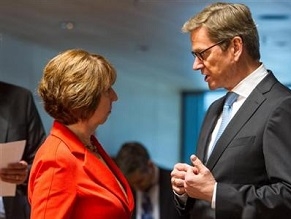|
World Jewish News

EU foreign policy chief Catherine Ashton (L) in conversation with German Foreign Minister Guido Westerwelle at Monday's Foreign Affairs Council in Luxembourg.
|
EU Foreign Ministers fail to reach consensus on Mideast statement as Ashton insists Council focused on supporting Kerry’s peace
25.06.2013, Israel and the World EU Foreign Ministers failed to issue anticipated critical resolution on Israeli settlement policy following their monthly meeting in Luxembourg on Monday, after Israeli Premier Benjamin Netanyahu is reported to have appealed directly to foreign policy chief Catherine Ashton for leniency on the issue on her visit to Jerusalem last week.
The settlement issue was widely expected to feature prominently on the agenda of the Foreign Affairs Council meeting, along with the EU’s ongoing reticence to designate Lebanese group Hezbollah a terrorist organisation.
But in the absence of any official conclusions from the Council, Ashton told a press conference that ministers had simply “reaffirmed our commitment to the two-state solution”.
“We fully support the current efforts of the United States for direct and substantial negotiations and we welcome very much the personal involvement and engagement of (US) Secretary (of State John) Kerry,” she added as she echoed her insistence in meetings with Israeli and Palestinian authorities in Jerusalem and Ramallah last week on “the importance of this initiative and the importance of our support for it”.
Ahead of his meeting with Ashton last Thursday, Netanyahu praised Kerry’s peace efforts as “the right thing to do”. “Israel is ready to resume these talks without preconditions today, yesterday and tomorrow. I hope that President Abbas will do the same, and I hope that Europe will support this effort because it's the right thing to do,” he added.
According to Israeli media reports Monday, discussions at the Luxembourg meeting varied widely, with staunch Israel critics Denmark and outgoing EU presidency holders Ireland thought to favour harsh conclusions such as those controversially adopted last May by the Council on settlement expansion, whilst traditional allies Germany, Italy, the Netherlands and Romania reportedly called for a more general statement supporting Kerry’s recent efforts to renew the stalled peace process.
Refuting allegations the lack of resolution pointed to a failure to reach consensus amongst the 27 EU member states however, Ashton insisted that the Council had “set out very clearly our position and we stand by that”.
“I think the discussion today was a recognition of the role Secretary Kerry is doing but also a recognition of the role we play and continue to play in a two state solution and the ongoing relationship we have with the people of Israel and the people of the Palestinian Authority,” she added.
Continuing to assert that EU rhetoric would focus on “how can we best support this process” championed by the US, she committed to revisiting Europe’ collective position at the next meeting of Foreign Ministers in July.
Ashton made no mention of the Hezbollah issue which has been discussed in two working group meetings. Until now, no unanimity could be reached among the 27 member states to support Britain’s formal request to blacklist the military wing of the Lebanese group.
Whilst Israel may well take encouragement from its apparent success in stalling further incendiary EU rhetoric, Jerusalem will likely be left frustrated by continued inaction on the Hezbollah issue, after Netanyahu told Ashton: “If Hezbollah isn’t a terrorist organisation, I don’t know what is a terrorist organisation.” “I would say the designation of Iran's proxy Hezbollah as a terrorist organisation is our second hope that Europe would do, and it would do the right thing,” he added.
Ashton had vowed in response to “think about the broader region on the questions that concern us all” with regard to the international community’s ongoing diplomatic approach to the Iranian nuclear threat.
by: Shari Ryness
EJP
|
|
